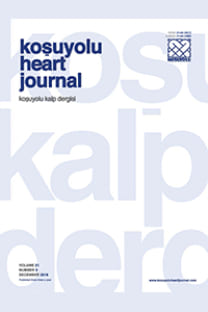Koroner Arter Baypas Operasyonu Sonrası Uyku Bozukluğu
Pittsburgh Uyku Kalitesi Endeksi anketi, uyku bozukluğu, koroner arter baypas
Sleep Disorder After Coronary Artery Bypass Operation
___
- 1. Khalida AM, Al-gersha K, Haboubi G, Al-Asady N. Effect of nursing educational program on recovery following CABG surgery: intervention study. Sci J Nursing/Baghdad 2005;18.
- 2. Yang PL, Huang GS, Tsai CS, Lou MF. Sleep quality and emotional correlates in Taiwanese coronary artery bypass graft patients 1 week and 1 month after hospital discharge: a repeated descriptive correlational study. PLoS One 2015;10.
- 3. Kazuhiro PI, Yusuke K, Koji H, Yasuyuki H, Koichiro O, et al. Relationship between daytime sleepiness and health utility in patients after cardiac surgery: a preliminary study. Int J Environ Res Public Health 2018;15:2716.
- 4. Ağargün MY, Kara H, Anlar Ö. Pittsburgh uyku kalitesi indeksi’nin geçerliği ve güvenirliği. Türk Psikiyatri Dergisi 1996;7:107-15.
- 5. Machado F, Souza R, Poveda V, Costa A. Non-pharmacological interventions to promote the sleep of patients after cardiac surgery: a systematic review. Rev Latino-Am Enfermagem Review Article 2017;25:e2926.
- 6. Redeker NS. Sleep and quality of life in cardiac surgery. Sleep Quality Life Clin Med 2008:367-73.
- 7. Aydın S, Yavuz T, Düver H, Kutsal A. The evaluation of quality of Life in elderly patients after coronary by pass operation by means of SF-36. Turk J Geriatr 2002;5:64-7.
- 8. Arıtürk AZ, Abakay A, Ülgen S. Obstructive sleep apnea syndrome and cardiovascular problems. Dicle Med J 2011;38:253-6.
- 9. Liao WC, Huang CY, Huang TY, Hwang SL. A systematic review of sleep patterns and factors that disturb sleep after heart surgery. J Nurs Res 2011;19:275-88.
- 10. Redeker NS, Ruggiero JS, Hedges C. Patterns and predictors of sleep pattern disturbance after cardiac surgery. Res Nurs Health 2004;27:217-24.
- 11. Dianatkhah M, Ghaeli P, Talasaz AH, Karimi AA, Salehiomran A, Bina P, et al. Evaluating the potential effect of melatonin on the post-cardiac surgery sleep disorder. J Teh Univ Heart Ctr 2015;10:122-8.
- 12. Vitiello MV, Larsen LH, Moe KE. Age-related sleep change: gender and estrogen effects on the subjective-objective sleep quality relationships of healthy, noncomplaining older men and women. J Psychosom Res 2004;56:503-10.
- 13. Slaven JE, Andrew ME, Violanti JM, Burchfiel CM. A statistical test to determine the quality ofaccelerometer data. Physiol Meas 2006;27:413-23.
- 14. Cappuccio FP, Cooper D, D’Elia L, Strazzullo P, Miller MA. Sleep duration predicts cardiovascular outcomes: A systematic review and meta-analysis of prospective studies. Eur Heart J 2011;32:1484-92.
- 15. Knapp-Spooner C, Yarcheski A. Sleep patterns and stress in patients having coronary bypass. Heart Lung 1992;21:342-9.
- 16. Rothenhausler H, Grieser B, Nollert G, Reichart B, Schelling G, Kapfhammer H. Psychiatric and psychosocial outcome of cardiac surgery with cardiopulmonary bypass: a prospective 12-month follow-up study. General Hospital Psychiatry 2005;27:18-28.
- 17. Ranjbaran S, Dehdari T, Sadeghniiat-Haghighi K, Mahmoodi Majdabadi M. Poor sleep quality in patients after coronary artery bypass graft surgery: An Intervention Study Using the PRECEDE-PROCEED Model. J Teh Univ Heart Ctr 2015;10:1-8.
- 18. Mitchisson AR, Kim HM, Rosemberg JM, Geisser M, Kirsh M, Cikrit D, et al. Acute postoperative management using massage as an adjuvant therapy. Arch Surg 2007;142:1158-67.
- 19. Foulk MA, Ingersoll-Dayton B, Kavanagh J, Robinson E, Kales HC. Mindfulness-based cognitive therapy with older adults: an exploratory study. J Gerontol Soc Work 2014;57:498-520.
- 20. Haimov I, Shatil E. Cognitive training improves sleep quality and cognitive function among older adults with insomnia. PLoS One 2013;8:e61390.
- 21. Lawlor DA, Hopker SW. The effectiveness of exercise as an intervention in the management of depression: systematic review and meta-regression analysis of randomised controlled trials. Br Med J 2001;322:763-7.
- ISSN: 2149-2972
- Yayın Aralığı: Yılda 3 Sayı
- Başlangıç: 1990
- Yayıncı: Sağlık Bilimleri Üniversitesi, Kartal Koşuyolu Yüksek İhtisas Eğitim ve Araştırma Hastanesi
Radyofrekans Ablasyon Tedavisinde Alternatif Giriş Tercihi
Deniz ÇEVİRME, Hakan HANÇER, Rezan AKSOY
Macit BİTARGİL, Helin KILIÇ EL, Nilüfer BEKTAŞ, Ersoy ENGİN, Tolga DEMİR, İ̇smail KORAMAZ
Süleyman Çağan EFE, Semi ÖZTÜRK, Ahmet Seyfettin GÜRBÜZ, Emrah ACAR, Mehmet Fatih YILMAZ, Sedat KALKAN, Cevat KIRMA, İ̇brahim Akın İZGİ
İzole Hipertrigliseridemi Hastalarında Fenofibrat Tedavisinin Aortik Sertlik Üzerine Etkisi
Süleyman Çağan EFE, Semi ÖZTÜRK, Ahmet Seyfeddin GÜRBÜZ, Cevat KIRMA, Emrah ACAR, Mehmet Fatih YILMAZ, Sedat KALKAN, İbrahim Akın İZGİ
Ortalama Trombosit Hacminin Periferik Arter Hastalığı Gelişimindeki Rolü
Dilek MERSİN ÖZCANLIOĞLU, Bedih BALKAN, Ünal AYDIN
Modifiye Bentall Prosedürlerinin Uzun Dönem Sonuçları
Özgür YILDIRIM, İ̇smail BALABAN
Yenidoğan ve Bebeklik Döneminde Arkus Aorta Rekonstrüksiyonları
Koroner Arter Baypas Operasyonu Sonrası Uyku Bozukluğu
Melike Elif TEKER AÇIKEL, Ali Kubilay KORKUT
Üç Ayrı Paravalvüler Defektin Transapikal Yol ile Dört Ayrı Cihazla Kapatılması
Alev KILIÇGEDİK, Deniz ÇEVİRME, Mehmet TÜRKMEN, Cevat KIRMA, Mehmet ÖZKAN
